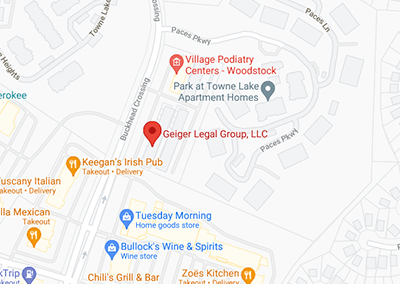Tips to Avoid Financial Scams for the Elderly

Advanced technology and loose regulations have made financial scams targeting the elderly increasingly sophisticated and frequent. At Geiger Legal Group, LLC, we want to help you protect your financial security and that of the older adults in your life. We’ll cover how to spot red flags that often signal elderly scams, where to seek help, and how to take preventive measures to ensure your financial safety. By following a few simple tips, you can help create a safer financial environment for yourself and Georgia’s seniors, where their assets and peace of mind are well-protected.
Understanding Financial Scams Targeting the Elderly
Senior scams target the elderly because they tend to have more savings and may not be as familiar with modern deceptive tactics. Many seniors are also less likely to report a scam, either because they don’t know how to do so or are embarrassed that they were tricked.
Understanding some of the most prevalent senior financial scams is the first step in protecting you and your loved ones from becoming victims. Among the most common are phone scams, in which fraudsters pose as government officials or family members in need. There are also internet scams involving phishing emails that trick seniors into revealing personal information. Investment and healthcare scams promise unreal benefits or involve fake services to drain the savings of unsuspecting individuals.
Recognizing the Signs of a Scam
Recognizing the signs of a financial scam can help protect older adults from becoming victims of fraud. Here are some tips from the Georgia Attorney General’s Consumer Protection Division:
- Requests for Personal Information: Be wary if someone asks for personal details like your Social Security number, bank account information, or credit card numbers.
- High-pressure Tactics: Scammers often create a sense of urgency, pushing you to act quickly. Watch for phrases like, “You have to act now” or “This offer expires soon.”
- Unsolicited Calls or Emails: If you receive a call or email from someone claiming to be a government official, a charity worker, or a tech support person without prior contact, the person calling you might not be on the up-and-up.
- Requests for Money Transfers: Be cautious if anyone asks you to wire money or pay with gift cards. These payment methods are favorites among scammers because they are hard to trace.
- Guaranteed Returns: Any offer that guarantees unusually high returns with little or no risk is a major red flag.
- Unfamiliar Caller ID: If the caller ID shows a number that doesn’t match the known number of the company or person in question, it could be a scam.
Preventative Measures to Protect Against Scams
Taking proper precautions can help you or older relatives avoid potential scams. Here are some tips from the National Council on Aging to prevent possible scams:
- Stay Informed: Keep up-to-date on the latest scam tactics, as scammers often change up their methods.
- Protect Personal Information: Never share your personal information, such as your Social Security number or bank details, over the phone or online unless you initiate the contact.
- Verify Contacts: If someone claiming to represent a company or a government agency contacts you, verify their identity by calling back using a number you find on an official website.
- Use Secure Networks: When accessing your financial accounts online, always ensure you are on a secure, private Wi-Fi network.
- Consult with Family Members: Before making any large payments or financial decisions, discuss it with a family member or a trusted friend.
- Stay Skeptical: Always be skeptical of offers that seem too good to be true, such as large sums of money for little to no investment.
Case Studies and Real-Life Examples of Financial Exploitation
Two of the most common examples of senior scams are tech support scams and sweetheart scams. In a text support phishing scam, fraudsters claim to be representatives from a well-known tech company, such as Microsoft or Apple, and inform seniors that their computer has a virus. They insist on immediate action, urging the victim to grant remote access to their computer or to pay for a fake anti-virus program to “fix” the issue. By granting remote access, victims compromise the security of their personal information, potentially causing substantial financial losses.
Sweetheart scams or romance scams target the emotional vulnerability of senior citizens, particularly those who are lonely. Scammers create fake profiles on dating sites or social media platforms, slowly building relationships with their targets. Once they have established trust, they start concocting stories about urgent financial troubles, coaxing their elderly victims to send money. These elder financial abuse scams can be emotionally devastating and financially crippling, leaving the elderly with a broken heart and an empty wallet.
The Role of Family and Community
Family members and friends play a crucial role in protecting older adults from scams. Regular communication is vital. By checking in often, friends and family can stay aware of the daily interactions and financial activities of elderly loved ones. Additionally, educating older adults about common elder fraud scams and the tactics fraudsters use can empower them to recognize and avoid potential threats on their own. Helping to manage and oversee financial transactions can prevent unauthorized access to their accounts. By staying involved and informed, family and friends can create a supportive and vigilant network that protects seniors from scams and exploitation.
What To Do If Your Elder Relative Is Scammed
Discovering that you or someone you know has fallen victim to a scam can be distressing, but taking swift action can help mitigate the damage. Here are the steps to take if you or an elderly friend or relative has been scammed:
- Report the Scam: Contact the local police and report the fraud. This can prevent further damage and possibly aid in catching the scammer.
- Notify Financial Institutions: Immediately inform affected banks or credit card companies to put a hold on accounts and prevent further unauthorized transactions.
- Change Account Information: Update passwords and security questions for online accounts that may have been compromised.
- Contact Credit Bureaus: To protect against identity theft, request a fraud alert or credit freeze on your or the victim’s credit reports.
- Seek Support: Consider contacting organizations that provide support and advice for scam victims, such as the Georgia Attorney General’s Consumer Protection Division.
- Contact an Elder Abuse Attorney: A lawyer can help you take action against a scammer or abuser and advise you on how to prevent further harm.
Contact Our Georgia Elder Abuse Attorneys for Help
If you or someone you know has been the victim of a financial scam, an elderly abuse lawyer from Geiger Legal Group, LLC, can help you determine your next steps and evaluate your options for recovering the money you lost. Call us today or complete our contact form for a free consultation.



































